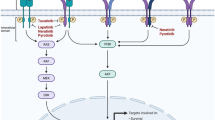Background:
The development of new chemotherapeutic agents and concepts of radiation therapy, administered as primary, adjuvant and palliative therapy, has led to new perspectives in breast cancer therapy. Apart from conventional chemotherapy, recently developed novel agents interfere with molecular mechanisms that are altered in cancer cells. Those targets are not necessarily breast cancer-specific. In this review we will focus on novel agents with potential or already proved benefit to breast cancer patients. Promising strategies include inhibition of growth factor receptors, blocking of tumor angiogenesis and signal transduction pathways, modulation of apoptosis, cancer vaccination, and inhibition of invasion and metastasis.
Methods: Reports of relevant studies obtained from a search of MEDLINE and studies referenced in those reports were reviewed.
Results: Apart from trastuzumab, other further developed compounds show promising results in clinical studies as a second generation of growth factor inhibitors. Different approaches in anti-angiogenetic therapy are under preclinical and clinical phase-II trials. Pro-apoptotic agents show synergistic effects with docetaxel in a clinical phase-I trial. Other compounds that target HSP 90, histone deacetylase and HMG-CoA reductase target atypical apoptotic pathways being lethal to tumor cells only but not to normal tissue, suggesting a tumor-specific way of action. MMP inhibitors have been demonstrating promising results in patients with refractory malignant pleural effusion in a phase-I trial. Several tyrosine kinase inhibitors currently under clinical investigation preliminarily show hopeful results in patients with advanced breast cancer. Furthermore, recent progress in defining the immunogenic epitopes of tumor antigens has rejuvenated the interest in cancer vaccines.
Conclusion: Typical dose escalation studies leading to the highest clinically still tolerated dose do not appear to be equally appropriate for the estimation of efficiency of those compounds as for conventional cytotoxic regimes. Rather, escalation up to an amount of therapeutic agent that is sufficient for maximum target inhibition should be promoted, where classical measures of cytoreduction such as complete or partial remission are replaced both by time to progression and treatment failure as an appropriate measure of the efficacy of an agent.
Hintergrund:
Die Entwicklung neuer chemo- und strahlentherapeutischer Therapieansätze bietet neue Perspektiven in der systemischen Behandlung des Mammakarzinoms. Abgesehen von der klassischen Chemotherapie setzen diese Medikamente bei den in Tumorzellen veränderten subzellulären Mechanismen an. Wenngleich einige dieser neuen Therapieansätze nicht allein für das Mammakarzinom spezifisch sind, sondern auch in der Behandlung andere Tumorentitäten erprobt oder bereits eingesetzt werden, sollen in dieser Übersichtsarbeit des Umfangs wegen lediglich fünf für das Mammakarzinom relevante Gesichtspunkte besprochen werden: Wachstumsfaktoren und deren Rezeptoren, Invasion und Metastasierung, Angiogenese, Apoptose sowie die Immuntherapie.
Methoden: Als Grundlage für diese Übersicht dienten in MEDLINE veröffentlichte Untersuchungen sowie darin zitierte Studien.
Ergebnisse: Neben Trastuzumab zeigen neue, weiterentwickelte Substanzen bereits in klinischen Studien viel versprechende Ergebnisse als Inhibitoren von Wachstumsfaktoren. Verschiedene Ansätze der antiangiogenetischen Therapie werden in präklinischen Experimenten untersucht und teilweise in klinischen Studien erprobt. Proapoptotische Ansätze zeigen synergistische Effekte mit Docetaxel in der Therapie des metastasierten Mammakarzinoms. Andere Verbindungen gegen HSP 90, Histondeacetylase und HMG-CoA-Reduktase wirken in entarteten Zellen apoptotisch, nicht aber in Normalgewebe und scheinen somit eine gewissen Tumorspezifität zu besitzen. Die Identifizierung typischer Tumorantigene sowie neue Erkenntnisse immunologischer Mechanismen haben das Interesse der Immuntherapie des Mammakarzinom wiederbelebt.
Schlussfolgerung: Typische dosisintensivierte Therapieregime bis zu einer von der Patientin gerade noch tolerierten Maximaldosis scheinen zur Beurteilung von Therapieeffekten solcher neu entwickelter Medikamente nicht geeignet zu sein. Vielmehr stellt die zur Hemmung des jeweiligen molekularen Ziels benötigte minimale Substanzkonzentration eine passende Messgröße dar. Klassische Einschätzungen des Therapieerfolgs anhand der Rate an kompletten oder partiellen Remissionen werden hier abgelöst werden von der Länge des Zeitintervalls bis zur Erkrankungsprogression oder bis zum Therapieversagen.
Similar content being viewed by others
Author information
Authors and Affiliations
Additional information
Received: October 19, 2001; accepted: January 18, 2002
Rights and permissions
About this article
Cite this article
Sauer, G., Deissler, H., Kurzeder, C. et al. New Molecular Targets of Breast Cancer Therapy. Strahlenther Onkol 178, 123–133 (2002). https://doi.org/10.1007/s00066-002-0957-0
Issue Date:
DOI: https://doi.org/10.1007/s00066-002-0957-0




